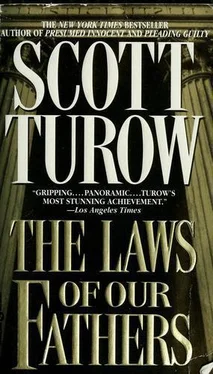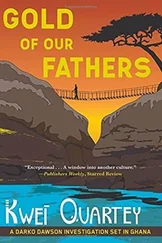Scott Turow - The Laws of our Fathers
Здесь есть возможность читать онлайн «Scott Turow - The Laws of our Fathers» весь текст электронной книги совершенно бесплатно (целиком полную версию без сокращений). В некоторых случаях можно слушать аудио, скачать через торрент в формате fb2 и присутствует краткое содержание. Жанр: Криминальный детектив, на английском языке. Описание произведения, (предисловие) а так же отзывы посетителей доступны на портале библиотеки ЛибКат.
- Название:The Laws of our Fathers
- Автор:
- Жанр:
- Год:неизвестен
- ISBN:нет данных
- Рейтинг книги:5 / 5. Голосов: 1
-
Избранное:Добавить в избранное
- Отзывы:
-
Ваша оценка:
- 100
- 1
- 2
- 3
- 4
- 5
The Laws of our Fathers: краткое содержание, описание и аннотация
Предлагаем к чтению аннотацию, описание, краткое содержание или предисловие (зависит от того, что написал сам автор книги «The Laws of our Fathers»). Если вы не нашли необходимую информацию о книге — напишите в комментариях, мы постараемся отыскать её.
The Laws of our Fathers — читать онлайн бесплатно полную книгу (весь текст) целиком
Ниже представлен текст книги, разбитый по страницам. Система сохранения места последней прочитанной страницы, позволяет с удобством читать онлайн бесплатно книгу «The Laws of our Fathers», без необходимости каждый раз заново искать на чём Вы остановились. Поставьте закладку, и сможете в любой момент перейти на страницу, на которой закончили чтение.
Интервал:
Закладка:
This devotion, the stuff of legends, would have been perfect, had it been better received. Sonny enjoyed my company, my idiosyncratic humor, my headlong commitment to what she thought was right, my unruly, experimental side. But she forbade all talk of love. In September 1969 she prepared to leave for the Bay Area, where she had been accepted at Miller Damon Senior University in an accelerated, interdisciplinary Ph.D. program known as Modern Critical Thought and Philosophy. I moped around until she finally suggested I come with her to California, a step I'd already secretly contemplated, given Hobie's destination for the same locale.
'Because you need a ride?' I was always trying to trap her.
'Seth.'
'No, seriously, man. What'll we be, roommates?'
'We'll be "living together." Dangerous words then for a man and a woman, full of a subversive appeal I could never reject. So we had driven west in my yellow VW Bug, in a two-car caravan with Hobie and his young girlfriend, Lucy McMartin. Big and good-looking, smooth-talking and funny, Hobie was a hit with many women, and Lucy had dropped out of her sophomore year at Easton to follow him. Lucy was cute in a Betty Boop way, a little freckle-faced white girl, narrowly made, always clothed in stylish items culled from second-hand stores – leather vests and a short-billed cap like the ones the Beatles wore in Help! Hobie found Lucy pliant, sweet-natured, and bright, if chronically naive, but she was generally overwhelmed by Hobie and his lunatic manner. Behind her back, we called her 'Groovy,' since that was her automatic reply to any inquiry from 'How do you do?' to discussion of the Tet Offensive.
Entering the town of Damon, California, was much like crossing a national border. Beyond the campus environs dwelled men who looked as if they had gotten their haircuts in pencil sharpeners and women in girdles, but here along Damon's main drag, Campus Boulevard, the culture of the young flourished in a tumbling bazaar atmosphere. The town's transient elements – students and street freaks, hippies, home runaways, and communards – now far outnumbered the indigenous residents, the faculty families, and various grumpy Latinos who had watched as Campus Boul sprawled, surrounding the bookstores and student hangouts and mercados with head shops, candle stores, and the new 'boutiques' vending tie-dyed dresses and garments of macrame. The traffic, thick at all hours with touring gawkers, staggered by, while street performers – mimes and bongo drummers and gentle pipers – did their things, and the Damonites, in leisure suits and floral granny gowns, strolled the avenue among the soiled barefoot hippies, each one inevitably accompanied by a mongrel dog leashed on a piece of string. On the building sides, the trisected peace sign was spray-painted, while harsher words praised the NFL in Vietnam, and Huey Newton, then in jail for supposedly killing a police officer. Appearing often amidst the graffiti in Day-Glo shades was a round-lettered injunction which simply urged, 'Be Free.' Arriving with Sonny, I found all of this, the commotion, the array, the slogans inspiring; I could feel the life of my generation – historical, dynamic, epochal – like a rush flowing through my arms. This was the bold new world, its shape as yet uncertain, but sure to be better than the one our parents had given us.
On the first weekend in town, Hobie led us to Dionysus '69, the theater-of-assault piece, in which cast members mingled naked with the audience. The next night it was Fillmore West, a teeming environment of maximum amplification, sweat, and drug deals, where amoeba-like colored visuals swarmed on enormous projector screens, and various rock maniacs cruised about with a hipper-than-thou air. Hobie, particularly, loved the Bay Area scene: so many wiggy new things to dig, so many new drugs to take. First citizen of the counterculture, he wore shirts mottled with balls of color the size of grapefruits, bell-bottoms bigger than his shoes, and tinted aviator shades. He'd also grown a large globe Afro, somewhat reluctantly, since he'd been at constant odds with the Black Power types at Easton, who called him a Tom for rooming with a white guy.
Hobie and I had grown up together in University Park, the only neighborhood in the Tri-Cities anybody might have called cosmopolitan and probably one of the few in America which, during the years of our childhood, could pass as integrated. Blacks had arrived in U. Park during the Civil War, brought by the Underground Railroad, and were quickly isolated through the device of four public parks laid out around the small area where they resided. But beginning in the 1930s it gradually became acceptable for Negroes of sufficient stature – doctors, dentists, lawyers, certain entrepreneurs – to settle on the white sides of the park. This depressed land values somewhat, and my father, always in relentless pursuit of a bargain, could not resist. Thus, I moved in down the street from Hobie Turtle. As youngsters, we had little contact; Hobie went to Catholic elementary school and, always large, was known as something of a bully. It was only in junior high that we suddenly found each other. He was someone else who openly admitted having weird thoughts about science, girls, his parents.
In high school, we went through phases together. For a while, we were beatniks, appearing each day in berets and shades and black turtlenecks and calling each other 'Daddy-o.' We spent weekend nights in the paneled basement of Hobie's home, eating pizza, listening to Mort Sahl and Tom Lehrer records, and debating the philosophical issues of male adolescence, such as whether vaginas, like snowfiakes, were each unique. In college, we'd become mildly notorious on the Easton campus as performers. During rush week, we did our own minstrel show, a Negro and a Jew, pining together in Jolson-faces before a picture of the honey-haired homecoming queen – Muffy or Buffy or Betty -crooning Bing's old tune: 'I'm dreaming of a' -
Hobie: 'White'
Seth: 'Christian.'
We thought we were hysterical. Both Lucy and Sonny had met the inevitable measure, proving tolerant of our strange riffs. The apartment Sonny and I found in Damon was only a block from them.
So we arrived, and in less than a year I had been handed over to doom. I look back at that young man with his hand-tooled-leather headband, his Sergeant Pepper mustache, the froth of mid-shoulder blondish hair, which my father in his correct Viennese accent never tired of comparing to Jesus's, and feel weak with shame. In spite of my degree from a fancy, famous Midwestern university, I was largely aimless. For a year or two in college I'd had thoughts that Hobie and I would become a comedy act, but I was simply not funny enough; these days I was talking about writing underground movies and had broken all records for repeat watchings of Jules et Jim and the films of Jean-Luc Godard. For the most part, I saw the draft as having rudely barricaded my way, but at moments, especially when I was stoned, I would recognize how large and undifferentiated my universe seemed, how lost I was inside myself. I was liable to fall under the influence of any strong suggestion, acting at moments with no more forethought than a person trying on hats. I knew only a few things for certain: That I was in love. That I wanted the world to be better than it was. Yet my passions seemed powerful enough to light the planet. And now that the earth is somewhat dimmer, I look back with a solitary heart, limp not merely with regret, but also with longing.
*
Sonny had her fellowship and I supported myself with hand-to-mouth measures typical of the era, food stamps, and a variety of odd jobs. I sold The Good Times out on Campus Boul and was eventually recruited to distribute a rival publication called After Dark, basically a skin mag, whose cover each week featured a blurry color separation of an unclothed full-busted beauty whose smoky look smoldered above the fold in the vending machines where I placed the papers. My principal occupation, however, turned out to be baby-sitting for a six-year-old named Nile Eddgar. His parents lived in the same apartment building as Sonny and I, a brown-shingled Victorian with a round bulb extension at one end that rose three floors to a roof pointed like a wimple. The inner construction was shabby – the usual marked walls and devastated carpeting of a typical student slum – but our apartment had an ample kitchen and many nifty Victorian touches, including a raised pattern in the plaster.
Читать дальшеИнтервал:
Закладка:
Похожие книги на «The Laws of our Fathers»
Представляем Вашему вниманию похожие книги на «The Laws of our Fathers» списком для выбора. Мы отобрали схожую по названию и смыслу литературу в надежде предоставить читателям больше вариантов отыскать новые, интересные, ещё непрочитанные произведения.
Обсуждение, отзывы о книге «The Laws of our Fathers» и просто собственные мнения читателей. Оставьте ваши комментарии, напишите, что Вы думаете о произведении, его смысле или главных героях. Укажите что конкретно понравилось, а что нет, и почему Вы так считаете.












